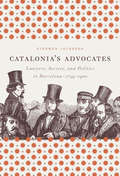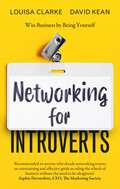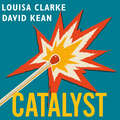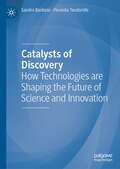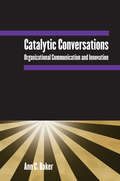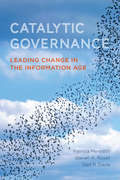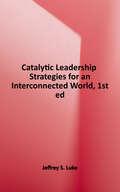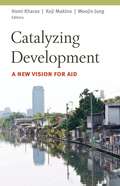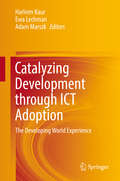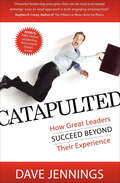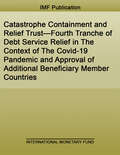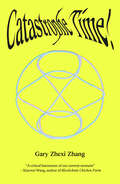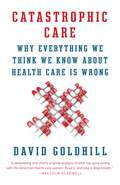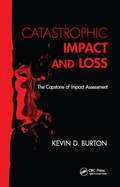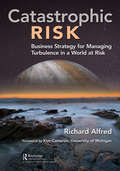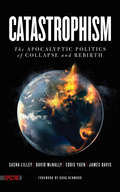- Table View
- List View
Catalonia's Advocates: Lawyers, Society, and Politics in Barcelona, 1759-1900
by Stephen JacobsonOffering a window into the history of the modern legal profession in Western Europe, Stephen Jacobson presents a history of lawyers in the most industrialized city on the Mediterranean. Far from being mere curators of static law, Barcelona's lawyers were at the center of social conflict and political and economic change, mediating between state, family, and society. Beginning with the resurrection of a decadent bar during the Enlightenment, Jacobson traces the historical evolution of lawyers throughout the long nineteenth century. Among the issues he explores are the attributes of the modern legal profession, how lawyers engaged with the Enlightenment, how they molded events in the Age of Revolution and helped consolidate a liberal constitutional order, why a liberal profession became conservative and corporatist, and how lawyers promoted fin-de-si cle nationalism. From the vantage point of a city with a distinguished legal tradition,Catalonia's Advocatesprovides fresh insight into European social and legal history; the origins of liberal professionalism; education, training, and the practice of law in the nineteenth century; the expansion of continental bureaucracies; and the corporatist aspects of modern nationalism.
Catalonia: A Debate on Secession within the European Union (Europa Country Perspectives)
by Xavier Cuadras-MoratóCatalonia: A New Independent State in Europe examines the main issues of the political process which is taking place in Catalonia today. The political confrontation between the Spanish and Catalan institutions has now reached the international arena, especially the debates concerning international recognition of a new Catalan state and its membership of the European Union (EU) and other international institutions. There are no precedents for the secession of a region from an EU member country that could be applied to the case of Catalonia. Therefore, it is not surprising that the world has many unanswered question about the process. This volume aims to provide answers to many of these questions in a systematic and rigorous way. Why has the political scenario in Catalonia changed so radically and so rapidly? Is this new situation only temporary and support for independence is likely to vanish very soon? What role has the deep economic crisis in Catalonia and in Spain played in the process? Is a potential new Catalan state economically viable? Which are the main legal controversies about self-determination and independence between the Spanish and Catalan institutions? Would an independent Catalonia be a member of the EU? This book will be of great use to academics and students in the field of politics and international relations, particularly those interested in European economic and political studies. It will also interest a wide segment of general readers interested in contemporary political issues.
Catalunya, més enllà dels núvols: Una proposta per recuperar el creixement econòmic
by Oriol BalaguerAquest llibre dona a conèixer el potencial real del sector aeronàutic a Catalunya, els reptes que haurà d'afrontar i les nombroses possibilitats de negoci que pot proporcionar al país amb una gestió descentralitzada, competitiva i eficient dels seus aeroports. Arran de la inauguració de la T1 de l'aeroport de Barcelona, el 16 de juny de 2009, es va obrir tot un món de possibilitats que permetien idear un nou escenari que situaria Barcelona al mapa. Caldrà tenir en compte, de cara al futur, una possible ampliació de l'aeroport al mar, la connexió de les dues principals vies d'entrada de turistes al país -port i aeroport- i l'establiment d'un hub que esdevingui el referent del sud d'Europa. Ressenyes:«De la mateixa manera que és més eficient gestionar la sanitat o l’ensenyament des dels governs regionals que des dels centrals, [...] també la gestió individualitzada dels aeroports proporciona millors resultats.»Ramon Tremosa, economista i polític «Els aeroports compleixen una funció molt important: donen la imatge del país. Moltes persones hi inicien o continuen un descans ple d’il·lusions. Són lloc de pas urgent per a gent que treballa.»Pedro Nueno, professor de l’IESE «El sistema centralitzat [...] de gestió dels aeroports a Espanya promou la concentració del trànsit a l’aeroport de Madrid, en especial pel que fa al trànsit de llarga distància.»Germà Bel i Xavier Fageda, economistes
Catalys Pacific
by Joshua Lev KriegerIn 2019, BT Slingsby founds Catalys Pacific, the first biotech "venture creation" fund in Tokyo. After convincing some of the biggest Japanese pharmaceutical firms to invest, BT hopes the fund can make a big splash and transform biotechnology innovation in Japan. After examining hundreds of potential investment opportunities, his team must decide which deals to pursue first. How can Catalys Pacific establish a positive investment track record while galvanizing an entire innovation ecosystem? To achieve its vision, the Catalys Pacific team must use its experience in the Japanese pharmaceutical industry to identify promising deals, while navigating corporate politics and potential cultural roadblocks.
Catalysing Change Agents: Enabling Impact Through Research for Development
by Seona MehargThis book provides an overview of the challenges and opportunities for creating positive systemic change through research for development projects, providing four real-world examples. Practical insights are offered on identifying and cultivating change agents through your projects and programs, increasing the likelihood of enduring success. Understanding and participating in these types of interventions enable researchers and practitioners to become better agents of change themselves.
Catalyst: Using personal chemistry to convert contacts into contracts
by David Kean Louisa ClarkeCatalyst will transform your approach to networking, making it fun and infinitely more effective. A good business developer, prospector and networker knows how to create a positive connection with the people they meet. They are the catalyst that creates a chemical reaction between strangers, and they know how to convert these opportunities into new business.Louisa Clarke and David Kean have spent their careers catalysing strangers into contacts and converting contacts into clients - and even into friends. They have built successful businesses together using the proven techniques in this book, and they have helped hundreds of companies around the world win billions in new business by applying the same methods. Catalyst is full of illustrative anecdotes, hard-won wisdom and a step-by-step methodology. Whatever industry you work in, if you need more clients to buy your services and you're not sure how to find them, convince them or win them, this is the book for you. Follow this approach and new business will come. You might even make some friends along the way. For many people, networking, prospecting and selling are scary. If the word 'networking' makes you recoil, if the word 'prospecting' conjures up terrifying spectres of endless cold calls, and if you run for the hills at the mention of 'sales', this book will be balm for you. Because, whilst it doesn't make it effortless, it does make it easy. 'Catalyst is a manual for winning business in today's economy, recommended to anyone who wants to grow their client base. Catalyst is brimming with great advice and inspiration' - Annette King, CEO Publicis Groupe UK
Catalyst: Using personal chemistry to convert contacts into contracts
by David Kean Louisa ClarkeCatalyst will transform your approach to networking, making it fun and infinitely more effective. A good business developer, prospector and networker knows how to create a positive connection with the people they meet. They are the catalyst that creates a chemical reaction between strangers, and they know how to convert these opportunities into new business.Louisa Clarke and David Kean have spent their careers catalysing strangers into contacts and converting contacts into clients - and even into friends. They have built successful businesses together using the proven techniques in this book, and they have helped hundreds of companies around the world win billions in new business by applying the same methods. Catalyst is full of illustrative anecdotes, hard-won wisdom and a step-by-step methodology. Whatever industry you work in, if you need more clients to buy your services and you're not sure how to find them, convince them or win them, this is the book for you. Follow this approach and new business will come. You might even make some friends along the way. For many people, networking, prospecting and selling are scary. If the word 'networking' makes you recoil, if the word 'prospecting' conjures up terrifying spectres of endless cold calls, and if you run for the hills at the mention of 'sales', this book will be balm for you. Because, whilst it doesn't make it effortless, it does make it easy. 'Catalyst is a manual for winning business in today's economy, recommended to anyone who wants to grow their client base. Catalyst is brimming with great advice and inspiration' - Annette King, CEO Publicis Groupe UK
Catalyst: Using personal chemistry to convert contacts into contracts
by David Kean Louisa ClarkeCatalyst will transform your approach to networking, making it fun and infinitely more effective. A good business developer, prospector and networker knows how to create a positive connection with the people they meet. They are the catalyst that creates a chemical reaction between strangers, and they know how to convert these opportunities into new business.Louisa Clarke and David Kean have spent their careers catalysing strangers into contacts and converting contacts into clients - and even into friends. They have built successful businesses together using the proven techniques in this book, and they have helped hundreds of companies around the world win billions in new business by applying the same methods. Catalyst is full of illustrative anecdotes, hard-won wisdom and a step-by-step methodology. Whatever industry you work in, if you need more clients to buy your services and you're not sure how to find them, convince them or win them, this is the book for you. Follow this approach and new business will come. You might even make some friends along the way. For many people, networking, prospecting and selling are scary. If the word 'networking' makes you recoil, if the word 'prospecting' conjures up terrifying spectres of endless cold calls, and if you run for the hills at the mention of 'sales', this book will be balm for you. Because, whilst it doesn't make it effortless, it does make it easy. 'Catalyst is a manual for winning business in today's economy, recommended to anyone who wants to grow their client base. Catalyst is brimming with great advice and inspiration' - Annette King, CEO Publicis Groupe UK
Catalysts of Discovery: How Technologies are Shaping the Future of Science and Innovation
by Sandra Barbosu Florenta TeodoridisThis book examines the impact of research technologies on innovation dynamics and economic growth. It proposes a conceptual framework to understand how research technologies, including AI and quantum computing, among others, influence the knowledge production process and innovation outcomes. The book offers insights for scientists, policymakers, and managers about conditions under which research technologies act as complements or substitutes to human capital skills, and how different levers can optimize their role in the innovation process.
Catalytic Conversations: Organizational Communication and Innovation
by Ann C. BakerIn today's increasingly globalized world, it is essential that people of diverse ethnicities and socio-economic backgrounds learn to work together and communicate effectively. This book offers a breakthrough approach to recognizing that differences among people are resources for organizations to tap as they strive to anticipate change and adapt rapidly in an unpredictable world. "Catalytic Conversations" provides a conceptual framework for understanding how complex communication patterns of social networks influence, and are influenced by, organizational structures. It discusses how to enhance the quality and viability of groups and organizational life by paying attention to how people talk - and do not talk - to each other. The book distinguishes between conversations that support organizational enhancement and others that inhibit innovation, and explores the complexity of organizational communication in detail.
Catalytic Governance: Leading Change in the Information Age
by Patricia Meredith Ged R. Davis Steven A. RosellAlthough the information age offers individuals from all walks of life the power to make their voices heard, we often end up with a cacophony of competing voices rather than a conversation. With so many people empowered to join the decision-making process, the number and diversity of stakeholders in governance situations poses a special challenge: how do you steer when so many hands are on the wheel?Catalytic Governance offers a proven approach to managing this challenge, built on the insight that effective leadership and governance depends less on traditional top-down approaches and more on creating shared meanings and frameworks. Drawing on their experiences managing transformational change in a complex, multi-stakeholder environment on issues ranging from finance to climate change, health, and the digital revolution, Patricia Meredith, Steven A. Rosell, and Ged R. Davis demonstrate how to use dialogue to engage stakeholders, explore alternative perspectives, develop shared mental maps and a vision of the future, and co-create strategies and initiatives to realize that future. While elements of this approach will be familiar, this is the first time they have been combined into a coherent model and tested together in practice. The book describes in detail how this was done in the process of transforming the Canadian payments system. The catalytic approach to governance is a powerful tool for leaders in the public and private sectors looking to lead and govern more effectively.
Catalytic Leadership: Strategies for an Interconnected World (Jossey-bass Leadership Ser. #177)
by Jeffrey S. LukeJeff Luke's book is simply outstanding and a must-read for those public leaders interested in advancing the common good. John Bryson, professor of planing and public affairs in the Hubert H. Humphrey Institute of Public Affairs at the University of Minnesota and author of Strategic Planning for Public and Nonprofit Organizations This groundbreaking guide presents a new kind of leadership that addresses the complex problems facing today's public leaders. These issues'such as economic development, homelessness, teen pregnancy, and many others'are interconnected in nature and have no quick fix solutions. Leaders in federal, state and local agencies must reach out beyond their boundaries to engage a much broader group of stakeholders to create sustainable strategies to address them. The catalytic leader brings together diverse individuals from multiple agencies to address interconnected public problems and work together toward solutions. Filled with case studies, real-world examples, and many other hands-on resources, Catalytic Leadership is written for the true public leaders'citizens from all walks of life, working together to tackle the toughest public problems.
Catalyzing Development
by Homi Kharas Koji Makino Woojin JungSome may dispute the effectiveness of aid. But few would disagree that aid delivered to the right source and in the right way can help poor and fragile countries develop. It can be a catalyst, but not a driver of development. Aid now operates in an arena with new players, such as middle-income countries, private philanthropists, and the business community; new challenges presented by fragile states, capacity development, and climate change; and new approaches, including transparency, scaling up, and South-South cooperation. The next High Level Forum on Aid Effectiveness must determine how to organize and deliver aid better in this environment. Catalyzing Development proposes ten actionable game-changers to meet these challenges based on in-depth, scholarly research. It advocates for these to be included in a Busan Global Development Compact in order to guide the work of development partners in a flexible and differentiated manner in the years ahead. Contributors: Kemal Dervis (Brookings Institution), Shunichiro Honda (JICA Research Institute), Akio Hosono (JICA Research Institute), Johannes F. Linn (Emerging Markets Forum and Brookings Institution), Ryutaro Murotani (JICA Research Institute), Jane Nelson (Harvard Kennedy School and Brookings Institution), Mai Ono (JICA Research Institute), Kang-ho Park (Ministry of Foreign Affairs and Trade, Korea), Tony Pipa (U.S. Agency for International Development), Sarah Puritz Milsom (Brookings Institution), Hyunjoo Rhee (Korea International Cooperation Agency), Mine Sato (JICA Research Institute), Shinichi Takeuchi (JICA Research Institute), Keiichi Tsunekawa (JICA Research Institute), Ngaire Woods (University College, Oxford), Sam Worthington (InterAction)
Catalyzing Development
by Homi Kharas Koji Makino Woojin JungSome may dispute the effectiveness of aid. But few would disagree that aid delivered to the right source and in the right way can help poor and fragile countries develop. It can be a catalyst, but not a driver of development. Aid now operates in an arena with new players, such as middle-income countries, private philanthropists, and the business community; new challenges presented by fragile states, capacity development, and climate change; and new approaches, including transparency, scaling up, and South-South cooperation. The next High Level Forum on Aid Effectiveness must determine how to organize and deliver aid better in this environment. Catalyzing Development proposes ten actionable game-changers to meet these challenges based on in-depth, scholarly research. It advocates for these to be included in a Busan Global Development Compact in order to guide the work of development partners in a flexible and differentiated manner in the years ahead.Contributors: Kemal Dervis (Brookings Institution), Shunichiro Honda (JICA Research Institute), Akio Hosono (JICA Research Institute), Johannes F. Linn (Emerging Markets Forum and Brookings Institution), Ryutaro Murotani (JICA Research Institute), Jane Nelson (Harvard Kennedy School and Brookings Institution), Mai Ono (JICA Research Institute), Kang-ho Park (Ministry of Foreign Affairs and Trade, Korea), Tony Pipa (U.S. Agency for International Development), Sarah Puritz Milsom (Brookings Institution), Hyunjoo Rhee (Korea International Cooperation Agency), Mine Sato (JICA Research Institute), Shinichi Takeuchi (JICA Research Institute), Keiichi Tsunekawa (JICA Research Institute), Ngaire Woods (University College, Oxford), Sam Worthington (InterAction)
Catalyzing Development through ICT Adoption: The Developing World Experience
by Harleen Kaur Ewa Lechman Adam MarszkThis book examines the role that Information and Communication Technologies (ICTs) play in growth and economic development promotion, specifically for developing countries. It highlights multiple methodologies for quantifying the impact of ICTs. This includes quantitative and qualitative methods, but also novel, conclusive and informative methodological approaches for measuring ICTs influence on economic development. The book highlights trends, perspectives, and success stories for different developing countries. ICTs bring new business models, innovations, capital-labor substitution, improved goods and services to developing markets. Because they can spread rapidly, with little cost and require minimal skills for usage, ICTs create a solid background for social and economic gains. They enable significant reduction in information asymmetries, which improves access to economic activities for multitude of agents, fostering participation, inter alias in labor market of disadvantaged societal groups. After almost two decades of rapid diffusion of ICT in developing world, this book seeks to assess the real benefits and consequences of ICTs adoption in developing countries. The chapters use broad, real-world based evidence to provide a better understanding of the precise nature of new technologies and their impact of the country`s economy and society.
Catapulted: How Great Leaders Succeed Beyond Their Experience
by Dave JenningsReach beyond your own personal experience and knowledge and rise faster and farther with this &“engaging and practical&” leadership guide (Stephen R. Covey, author of The 7 Habits of Highly Effective People). Being an effective leader means making decisions. But many of those decisions may pertain to situations or information you aren&’t be familiar with. What is a leader to do then? You have to make choices about the future for yourself, your team, and your organization. You need to get your team aligned in the same direction while building key relationships both internally and externally. And, you have to do all this while you maintain your sanity among competing demands. Leadership expert Dave Jennings doesn&’t ask you to change your leadership skill set. He invites you to change your mind set about how you approach life when you are in over your head—sometimes way over your head. Catapulted is a &“great read&” that will provide you with the tools to succeed in situations that go beyond your comfort zone. Get ready to fly (Gary Bowen, chief financial officer, OGIO International).
Catastrophe Bonds at Swiss Re
by George Chacko Peter Hecht Vincent Dessain Anders SjomanIn 2002, Swiss Re, the world's second--largest insurance company, is considering securitizing parts of its risk portfolio in the capital markets. This would be a first for the company that, until then, had never transferred risk off its balance sheet. Peter Giessmann, head of the Retrocession Group, is considering catastrophe bonds as a way of transferring risk. "Cat bonds" are securities whose payments depend on the probability of a catastrophe occurring, such as an earthquake or hurricane. This case outlines the traditional reinsurance market and securitization efforts that have taken place in the past and then focuses on Swiss Re's decision as a sell-side participant in the cat bond market.
Catastrophe Containment and Relief Trust—Fourth Tranche of Debt Service Relief in The Context of The Covid-19 Pandemic and Approval of Additional Beneficiary Member Countries (Policy Papers)
by International Monetary FundA report from the International Monetary Fund.
Catastrophe Time!
by Gary Zhexi ZhangA collection of essays, fictions, and interviews exploring the weird temporalities of finance and catastrophe.Once, financial practitioners plied a hybrid trade as hydrologists, star-gazers, and weather-watchers who sought to discover the natural laws of value and exchange as they did the divine order of an unchanging nature. Today, corporate firms hire trend forecasters and scenario planners to play out strategic fictions in virtual worlds. Hurricane insurance markets simulate a turbulent climate to offer investment instruments to hedge against the risks of the stock market. And for financial astrologers operating in the city of London, celestial motions provide a cosmic map that orients the mood of terrestrial markets.Bringing together artists, researchers, and interstitial practitioners, Catastrophe Time! pays attention to the conditions of speculative knowledge on an increasingly volatile planet. Traversing a gray zone between rigorous research and operative science fictions, its contributors question how practices of speculation may transform, undermine, and at times exceed, the worlds they set out to model.Edited by artist Gary Zhexi Zhang, Catastrophe Time! explores the power of temporal technologies—whether currencies, conspiracies, or simulation models—to shape reality through fiction. By bringing together researchers and writers working at the boundaries of temporal practices, including Diann Bauer, Philip Grant, Bahar Noorizadeh, Habib William Kherbek, Klara Kofen, Kei Kreutler, Suhail Malik, Bassem Saad and Gordon Woo, this urgent volume seeks to make sense of the unraveling times in which we live.
Catastrophes and Unexpected Behavior Patterns in Complex Artificial Populations (Evolutionary Economics and Social Complexity Science #27)
by Stanislaw RaczynskiA major objective of this monograph is to present an agent-based simulation of artificial populations. The focus is on possible unexpected or catastrophic events that may spontaneously appear in simulations. A short recall of the tenets of the theory of catastrophes is given. Several examples of artificial society simulations are provided as the main topic of the book. With agent-based modeling, possible catastrophes and unexpected events in artificial populations are simulated. The book presents a new modeling and simulation tool, applied to social system simulation. The models are coded in the object- and agent-oriented language Bluesss (Blues Simulation System), related to the C++ language. The program code consists of a series of generic declarations of processes. Each of them includes a number of events that are coded in C++. At the runtime, a population of objects is generated. All the objects (agents) start to execute their own events, and interact with one another. During the simulations it is possible to observe the macro-behavior of the population, where some unexpected or "catastrophic" events occur. The examples include a stock market crash, catastrophes in extended prey–predator systems, growing organisms and cancer, epidemics, social inequality and economic decay, mass-service systems, and more. Remarks on possible simultaneous events are also included.
Catastrophic Care: How American Health Care Killed My Father--and How We Can Fix It
by David GoldhillA visionary investigation that will change the way we think about health care: how and why it is failing, why expanding coverage will actually make things worse, and how our health care can be transformed into a transparent, affordable, successful system. In 2007, David Goldhill's father died from infections acquired in a hospital, one of more than two hundred thousand avoidable deaths per year caused by medical error. The bill was enormous--and Medicare paid it. These circumstances left Goldhill angry and determined to understand how world-class technology and personnel could coexist with such carelessness--and how a business that failed so miserably could be paid in full. Catastrophic Care is the eye-opening result.Blending personal anecdotes and extensive research, Goldhill presents us with cogent, biting analysis that challenges the basic preconceptions that have shaped our thinking for decades. Contrasting the Island of health care with the Mainland of our economy, he demonstrates that high costs, excess medicine, terrible service, and medical error are the inevitable consequences of our insurance-based system. He explains why policy efforts to fix these problems have invariably produced perverse results, and how the new Affordable Care Act is more likely to deepen than to solve these issues. Goldhill steps outside the incremental and wonkish debates to question the conventional wisdom blinding us to more fundamental issues. He proposes a comprehensive new way, where the customer (the patient) is first--a system focused on health and maintaining it, a system strong and vibrant enough for our future. If you think health care is interesting only to institutes and politicians, think again: Catastrophic Care is surprising, engaging, and brimming with insights born of questions nobody has thought to ask. Above all it is a book of new ideas that can transform the way we understand a subject we often take for granted.
Catastrophic Coastal Storms: Hazard Mitigation and Development Management
by Timothy Beatley David R. Godschalk David J. BrowerAs people cluster on the coast in increasing numbers, coastal populations become more vulnerable to severe damage from catastrophic coastal storms. The authors contented that current public policy has proved unable to cope with the growing problem, and in response they present a comprehensive analysis of coastal storm hazards, standard policy approaches, and promising new means of managing coastal growth.Catastrophic Coastal Storms offers a solution to the policy problem by proposing a merger of hazard mitigation with development management, basing this on extensive surveys of at-risk coastal locations and case studies of post-hurricane recovery. Starting with the local level of government and proceeding to state and federal levels, the authors propose a strategy for overcoming the formidable obstacles to safeguarding the shoreline population and its structures from hurricanes and other severe storms.
Catastrophic Impact and Loss: The Capstone of Impact Assessment
by Kevin D. BurtonThe author‘s previous work, Managing Emerging Risk: The Capstone of Preparedness considered the notion of risk and what constitutes risk assessment. It presented scenarios to introduce readers to areas of critical thinking around probability and possibility. Six months after the book‘s publication, many of the scenarios came true, and other, more m
Catastrophic Risk: Business Strategy for Managing Turbulence in a World at Risk
by Richard L. AlfredImagine that you are a corporate executive or small business owner in a midwestern city under water after weeks of extreme weather and drenching rainfall. Infrastructure has been damaged beyond repair, transportation arteries are closed, and your supply chain is broken. Families have been driven from homes, food and water are in short supply, and people are becoming unruly. Government agencies are not in a position to help. Declining revenue and partisan antipathy fueled by ideological differences have eroded confidence in government. The city is in total disrepair and unable to deliver desperately needed services. It is edging toward implosion and community leaders have turned to you for help. Catastrophe that would have been unthinkable in earlier times is a reality in a world coming out of pandemic and facing existential threats such as climate change, inequality and global conflict. Catastrophic Risk: Business Strategy for Managing Turbulence in a World at Risk challenges business to step up and assume a pivotal role with communities under stress due to prolonged exposure to risk. When powerful societal forces meet behavior that deters response to risk, the consequences of risk are exacerbated. The compounding effect of behavior on risk has opened an important role for business in mobilizing people and communities in times of crisis. It is a role that cannot be fulfilled, however, without purpose, strategy and plans sufficiently robust to overcome the threat of risk. To prosper in this environment, business will need to make a significant contribution to society as well as to deliver financial performance. For companies, this will mean involvement in community in ways that significantly depart from current practice. For leaders, it will mean new skills—contextual sensitivity, a greater understanding of behavioral dynamics, and enhanced capacity to relate to people on an emotive basis. This book is about the relationship between risk, societal forces and human behavior—a relationship informed by the sciences that is critically important for business. Its goal is two-fold: to bring catastrophic risk to the world of business and to further business engagement in service to the common good.
Catastrophism: The Apocalyptic Politics of Collapse and Rebirth (Spectre)
by James Davis Doug Henwood Sasha Lilley Eddie Yuen David McNallyAmid a global zeitgeist of impending catastrophe, this book explores the culture of fear so prevalent in today's politics, economic climate, and religious extremism. The authors of this collection argue that the lens of catastrophe through which so many of today's issues are examined distorts understanding of the dynamics at the heart of numerous problems, such as global warming, ultimately halting progress and transformation. Arguing that catastrophic thinking results in paralysis or reactionary politics, the authors posit that the myths of 2012 have negative affects across the political spectrum and urge activists not to give up their beliefs and instead focus on working on issues now instead of waiting until society has ended and needs to be rebuilt.
